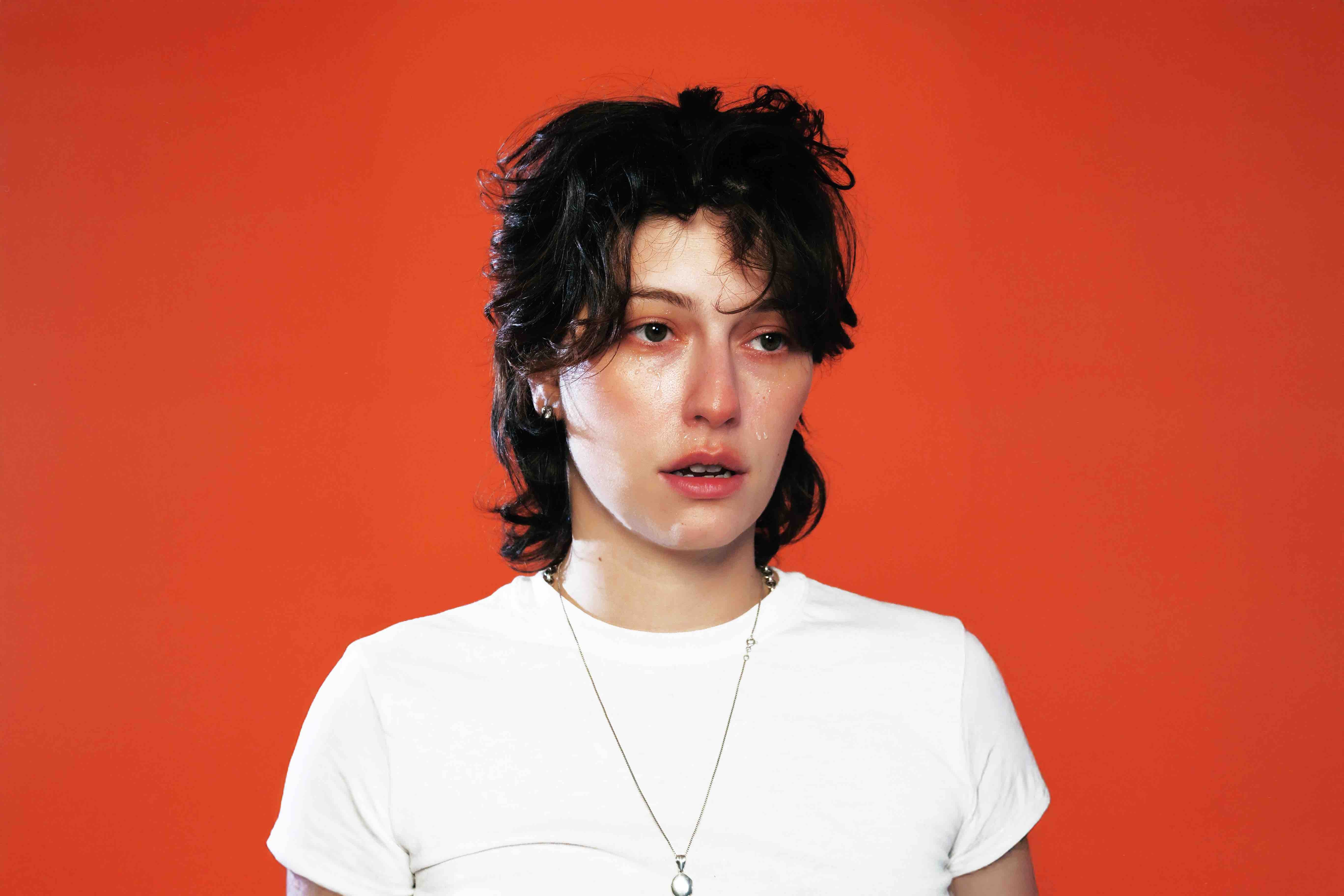
To mark the launch of her new album, the musician Mikaela Straus, aka King Princess, hauled a 200-pound steel coffin onto a stage in Brooklyn. And she lay there, eyes shut in an open casket, as her fans paid their respects. It was a symbol of her rebirth, and a vigil for her old era: in 2023, Straus took a break from making music and left Mark Ronson’s Columbia imprint, Zelig Records, for the independent label Section1. She also left Los Angeles and moved back home to New York, and she saw the end of a four-year relationship.
“This is the beginning of me putting out music and loving it again,” the 26-year-old tells me, adding that the commercialisation of her craft began to feel “stinky”. “I grew up writing music as a form of therapy,” she says. “And then it’s monetised. You get signed and then you’re not putting [music] out for yourself anymore.” Overwhelmed by numbers and statistics, she began to feel numb. “Now I feel like I’ve let go – it’s a really good exercise in detachment,” she says brightly.
The result of that period is Girl Violence, Straus’s first album in three years, and her most decisive yet. It was such a purge that she likens it to giving birth to an infant. “It feels like I’m split open. The baby was 15 pounds,” she says, utterly deadpan. “P***y and asshole are one. The doulas have come and gone.”This is signature Straus: she fluctuates between a kind of studied nonchalance and a fiery brazenness. Today, she’s sitting across a boardroom table in Section1’s London office. Her pale, elf-like face is framed by a shaggy, brunette mullet. She slinks back in her chair to sip on her smoothie, wearing a fuchsia Polo shirt underneath a black, oversized blazer with Frankenstein-style shoulder pads.
I can see how releasing Girl Violence has been cathartic for her. The record is rockier, grittier and more emotional than much of her past material – solidified by the shoegazey guitars that roar through “Cry Cry Cry”, the heavy snare drums pulsating on “I Feel Pretty”, and the gravelly vocals that take an ex-lover down to a mere “fly in a glass” on “Jaime”. It’s virtually unrecognisable from her platinum 2018 single “1950”, a wafty indie pop ballad about a complex queer relationship. It was the track that ignited her career (it placed 17th on the US charts, led to a Harry Styles co-sign, and an appearance on Saturday Night Live.)
Girl Violence, conceptually, relates to the subliminal warfare that Straus suggests women wreak on each other’s lives. It is the antithesis to the “basic ass masculine violence that’s everywhere in the world right now”, she says. It’s about women who weaponise their emotional intelligence and empathy for either “good or evil”.
I tell Straus that the term is incredibly accurate – and that she should look into officially coining it. She shrugs. “I am the lesbian Shakespeare,” she says, as if it were common knowledge. “I do think I’m an accidental lesbian professor. Clearly not a real one, because I have no degrees, but I do think I could teach a class on it.” I mention that “Brat summer” – from Charli XCX’s hit record last year – was chosen by the Collins Dictionary as its 2024 word of the year. Straus comically turns to her publicist: “Do you know anyone who can get me in?”
Girl Violence is Straus’s first release in three years – and she’s reemerged into a moment where queer horniness and heartache have become chart-topping themes for some of the biggest names in pop. Chappell Roan’s “Good Luck, Babe!” – about a closeted lesbian who tries to avoid her true feelings – has accumulated more than 2 billion streams, while Billie Eillish placed fifth on the US Billboard Charts for “Lunch”, her 2024 song about cunnilingus. And there’s Reneé Rapp, who sang about “Pretty Girls” on her hit record Bite Me.
Straus, who is non-binary (she uses she/they pronouns) and came out as gay as a child, says that when she released “1950”, there was a deficit in music written from this lens. Now, though, she thinks that tropes of queerness are sometimes commodified. “The people you’ve named are incredible queer artists, but you can totally tell that people are like, ‘It’s cool to be gay now, so let me just write a song about kissing a girl in a club,’” she says. “You know that the dial is changed when it becomes lucrative to put on an identity or try it on for the sake of sparking interest in your music.”

Straus’s work has never been vague about her sexuality. “My music isn’t really about the possibility of being queer or being with someone who possibly could be queer, or is trying it on. My music is about expert-level lesbianism,” she says matter-of-factly. “I write music about love and loss and mess, and that’s through the lens of someone who’s been gay and out since I was a little kid.”
She does think it’s easier now for queer musicians to exist and not be defined by their sexuality. Straus recalls several uncomfortable interviews early in her career, which she says wouldn’t happen today. “The questions were like, what’s it like being gay and making music? I was 19. It was crazy, they wanted to know who I was f***ing, there was such an emphasis on the sex part of it. The oddity was like, ‘Oh, you eat p***y.’ And now looking back, I can mourn what that was like, but also feel really happy that people aren't approached like that anymore.”
In her short break from making music, Straus found escape in her first acting role, in the second season of mystery series Nine Perfect Strangers, which stars Nicole Kidman as a sinister Russian therapist. She also stars alongside Hugh Jackman in Craig Brewer’s forthcoming musical film Song Sung Blue, about the rocky life of a Neil Diamond tribute act. Jackman, Straus says, became a “King Princess stan” after she gave him an unreleased vinyl of Girl Violence.
She describes the actor as the “most gracious” on set; he greeted everyone politely each day, and was always the last to leave. “I just thought, ‘Wow, that’s just such a great example of how you just don’t need to be a dick,” Straus says. The pair’s friendship flourished; he invited her to join him onstage at his Radio City residency, where they duetted Sonny & Cher’s 1965 love song “I Got You Babe”. She learnt a lot from Jackman – so much that she’s already booked another acting gig. “I really just want to push myself,” she says. “So anyone who’s down to let me get in full prosthetics and like, cuckoo bananas, I’m down.”

Straus’s father is a recording engineer and her mother has long worked in fashion, and she tells me she grew up watching her father work at his recording studio – that led to her recording her first song aged five (a 12-bar blues about her childhood dog, Jackie, running away). Straus is also the great-great-granddaughter of US congressman and Macy’s co-owner Isidor Straus, who died on board the Titanic, while travelling first class with his wife, Ida. In James Cameron’s 1997 film about the catastrophe, they embrace each other in bed, crying, as the ship sinks.
Straus isn’t coy when addressing her family’s history. When a group of wealthy businessmen went missing on the OceanGate submersible in 2023 – on an expedition to explore the Titanic wreckage – she criticised the rich for “making terrible decisions”. “I think there is a cycle of bajillionaires wanting to explore s*** and then dying,” Straus said in a TikTok at the time. “Like, look at my f****ing family, right?”
That sentiment has never been more relevant, now that celebrity space missions are a regular occurrence, thanks to Jeff Bezos’s Blue Origin company. “I've always thought it was an interesting phenomenon that rich people love to go places they’re not supposed to go,” she tells me. “They think they’re invincible because they’re rich, then it explodes and it’s like, ‘Oops!’ It’s so deranged to me.”
Straus is keen to point out that her line of inheritance was spent long before she was born. “If you look at the bullet points of it and you hear like Macy’s, Titanic, first class, you’re like, ‘nepo baby’. That’s the natural connection,” she says defensively, saying she “has not seen a dime” of her family’s money. She does, however, admire what she’s learnt about her great-great-grandparents. “I am proud of what I have heard about the way in which the Macy’s employees were treated,” she says. “They sounded like chill people.”
As a homage to her past, Straus and her mother designed a new T-shirt for the merchandise for her forthcoming tour. It depicts Straus, completely nude apart from some strategically placed tape on the intimate areas, with “King Princess” emblazoned in the iconic Macy’s serif font and star logo.
“It’s really c*** to have like, my p***y out on a Macy’s themed Girl Violence T-shirt,” she says. She pauses and eyes my blouse. “I’m sorry, but you need that T-shirt – it would look great with your lil’ Ganni shirt.” I promise to oblige.
‘Girl Violence’ is out now via Section1
Sean Ono Lennon: ‘People say I grew up in the shadow of my dad – but Yoko really did’
Rufus Wainwright: ‘Creativity helps to fend off the darker angels’
Sophie Ellis-Bextor: ‘Playing the baddie was a protective layer for me’
Reneé Rapp: ‘Tina Fey said, ‘What’s wrong with you? You’re insane’’
How Oasis brought this divided nation a rare moment of unity
Will Smith’s comeback has been a disaster – but does the punishment fit the crime?







